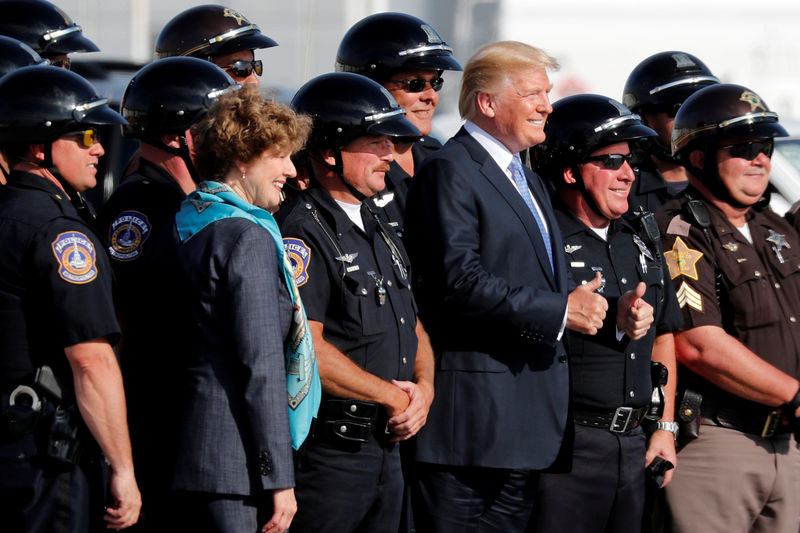By Kevin Drawbaugh
WASHINGTON (Reuters) - President Donald Trump's tax plan would let U.S. companies take bigger, faster deductions on capital investments, a step some experts said would deplete Washington's policy arsenal by using up a tax break normally reserved for fighting recessions.
By putting a five-year "immediate expensing" provision in his plan, Trump handed a win to some businesses, especially capital-intensive ones such as oil drillers, that could gain from it through savings on new plant and equipment purchases.
While some industrial sectors might get a short-term boost from the tax break, critics said its wider business impact was unclear, as was whether it is needed with the economy slowly but steadily growing and investment capital abundant.
Moreover, some said, a five-year immediate expensing policy could set up a capital investment hangover in late 2022 or 2023 by shifting private-sector plant and equipment purchases into the five years covered and out of later years.
One outcome would be sure, they said: putting immediate expensing in place for the next five years would make it unavailable until 2022 to combat a possible future recession.
"It's hard to see how moving to full expensing, except at the margin, would produce the growth that they're looking for from this provision," said corporate tax analyst Robert Willens, formerly an executive at KPMG and Lehman Brothers.
"It's also true that, once you go to full expensing, there's nothing more you can do, particularly during a later downturn when you might really need to provide a jolt to the economy."
Immediate expensing lets companies take a tax deduction for the full value of new plant and equipment upon purchase, rather than stringing out deductions over several years under accelerated or normal depreciation schedules.
FIVE YEARS
Immediate expensing has been tried before, but not for as long and at the maximum level proposed by Trump, his advisers and congressional Republicans. Their plan faces months of debate in Congress before it could become law.
It calls for immediate expensing "for at least five years" at "an unprecedented level" and urges Congress to work out the details, with a focus on helping small businesses.
"That will be something that people have never seen before and it will be truly great," Trump said on Friday at a National Association of Manufacturers event where his remarks were applauded by a roomful of business executives.
Federal tax revenues would be slashed under Trump's plan. An estimate of immediate expensing' s revenue impact earlier this year was for a loss of $2.2 trillion over a 10-year window, according to the Tax Foundation, a business-focused group that supports making immediate expensing permanent, not temporary.
Scott Hodge, president of the foundation, said permanent expensing is needed if Trump wants to meaningfully boost economic growth. "The only way to get there is by having permanent immediate expensing for all capital investments, not a short-term policy that robs investment from the future.
"Only then do you get the long-term increase in investments that boost productivity, wages and GDP,” Hodge said.
PART OF THE PLAN
Louisiana Republican Senator Bill Cassidy told reporters on Capitol Hill on Tuesday that "full expensing could be quite effective for economic growth. I'm favorably disposed. But I'd like to see it in the context of everything else."
Some tax experts questioned the need for expensing at all. While U.S. economic growth has been sluggish, there is little evidence that businesses are short on investment capital.
"There's no sign that there's a shortage of capital available to business today ... So is immediate expensing really necessary?" asked Ed Kleinbard, a law professor at the University of Southern California and former chief of staff of the U.S. Congress's Joint Committee on Taxation.
The tax code has not been overhauled since 1986 under former President Ronald Reagan. Trump's plan is largely a set of tax cuts that is less ambitious than Reagan's sweeping package, but the plan is politically important to the Republicans.
After more than eight months in office, Trump has no major domestic policy achievement. Much is riding on the tax plan, which the business community has eagerly awaited.
Immediate expensing was put in place under former Democratic President Barack Obama for qualified investments between September 2010 and January 2012, part of his recovery program after the deepest U.S. recession in decades.
After 2012, immediate expensing was cut to 50 percent of new investment through 2017. It has been slated to decline in phases to 40 percent in 2018 and 30 percent in 2019. Trump's plan would bring it back up to 100 percent through late 2022.
That would be the year "the buzz wears off," said Steven Rosenthal, senior fellow at the Urban-Brookings Tax Policy Center, a Washington tax think tank.

"Businesses will accelerate their investments to claim bigger write-offs, and then the party ends," he said.